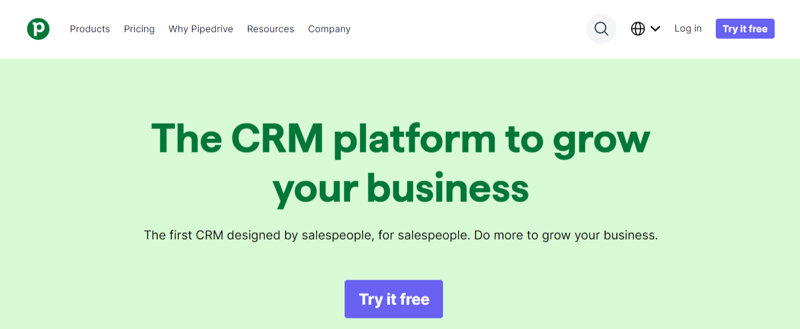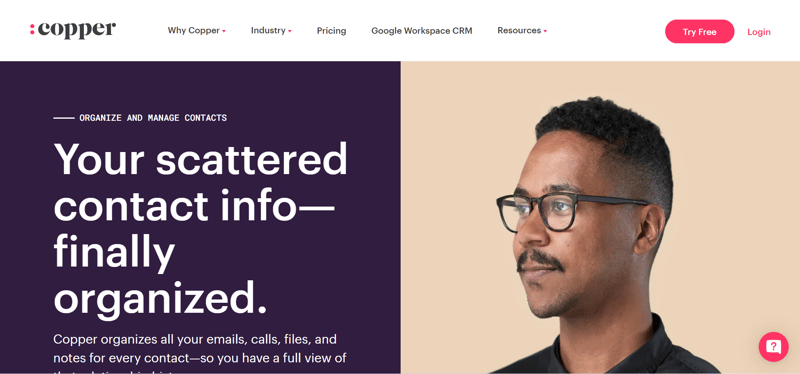
Cheap CRM vs. Expensive CRM: How Much Are You Really Getting?
 Updated on
Updated on
 By Bradley Kovacs
By Bradley Kovacs
Bradley Kovacs
Bradley has been passionate about technology since childhood, starting with Microsoft Flight Simulator at age six. In college, he automated his data e...
learn more
Bradley Kovacs
Bradley has been passionate about technology since childhood, starting with Microsoft Flight Simulator at age six. In college, he automated his data e...
Table of Contents
Table of Contents
Have you ever been torn between buying a cheap blender that barely blends and a ridiculously expensive one that claims to blend your fruits and dreams into smoothie perfection? Yeah, we've all been there. But when it comes to CRM software, the struggle is real! Just how much are you getting with a cheap CRM? Let's find out, shall we?
This article will explore cheap CRM software's advantages and disadvantages. We'll help you navigate the vast sea of options and provide key factors to consider when choosing the perfect CRM for your business.
Here's what we'll cover:
- Cheap CRM vs. expensive CRM
- Advantages of affordable CRM software:
- Disadvantages of cheap CRM software:
- Factors to consider when choosing an cheap CRM:
Remember, the goal is to find a CRM that balances functionality and affordability perfectly. So, let's explore together and ensure that your CRM decision leaves you smiling from ear to ear without emptying your pockets.
Cheap CRM vs. Expensive CRM: Similarities and Differences
When it comes to CRM solutions, businesses often have to choose between cheap or expensive options. This section will compare and contrast the key features of cheap and expensive CRM solutions.
By evaluating their similarities and differences, you can make an informed decision based on your budget and business requirements.
|
Criteria |
Cheap CRM |
Expensive CRM |
|
Cost |
Affordable, low-cost, budget-friendly. |
Expensive, high-cost, premium. |
|
Features |
Basic functionality with limited features. |
Extensive features and advanced capabilities. |
|
Scalability |
Limited scalability for smaller businesses. |
Highly scalable for large enterprises. |
|
Customization |
Limited customization options. |
Extensive customization capabilities. |
|
Integration |
Basic integration with popular software. |
Wide range of integrations with various platforms and tools. |
|
User Support |
Basic customer support options. |
Robust customer support with dedicated representatives. |
|
Security |
Standard security measures. |
Enhanced security features and advanced data protection. |
|
User Experience |
Simple and user-friendly interface. |
Sophisticated interface with a steeper learning curve. |
|
Reporting and Analytics |
Basic reporting and analytics capabilities. |
Advanced reporting and analytics features. |
|
Implementation Time |
Quick and easy implementation. |
Longer implementation time with more complex configurations. |
|
Customer Satisfaction |
Suitable for small businesses with basic CRM needs. |
Ideal for large enterprises with complex CRM requirements. |
|
Upgrades and Updates |
Limited updates and upgrades. |
Regular updates and upgrades to enhance functionality. |
It is important to note that the above comparison is a generalization and may vary based on specific CRM providers and their offerings. Before deciding, we recommend thoroughly evaluating the features, pricing plans, customer reviews, and compatibility with your business needs.
Advantages of Affordable CRM Software

When managing customer relationships, finding a CRM solution that fits your budget without compromising functionality is like stumbling upon a pot of gold at the end of a rainbow. Let's explore the advantages of these affordable CRM systems worth looking into.
1. Costs Less But Gets the Job Done
Picture this: You're a small business owner searching for a CRM that won't drain your coffers. You need a solution that does the job without forcing you to auction off your firstborn. Affordable CRM software swoops in to save the day.
These cost-effective options offer the core functionalities you require, from contact management and lead tracking to email marketing and sales automation. They may not boast their high-end counterparts' flashy bells and whistles, but they pack enough punch to keep your business humming smoothly.
Based on a report from Zippia, companies that adopt CRM can experience significant improvements in their business metrics. These improvements include a 300% increase in conversion rates, a 50% increase in sales productivity, and a 20% reduction in labor costs.
That's like buying your morning latte and getting a muffin for free! By keeping costs in check, you can allocate your hard-earned dollars to other critical business areas, such as marketing campaigns or expanding your product offerings.
2. Often Provides Features that are Attractive to SMBs
Affordable CRM software has a secret recipe for success: understanding small and medium-sized businesses' unique needs. These CRM solutions are tailor-made for SMBs like yours, offering features that cater to your specific requirements.
- Need an intuitive user interface that your team can master in a jiffy? Check.
- Require seamless integration with your existing tools and technologies? Check.
- Desire customizable workflows that align with your business processes? Double check!
With affordable CRM systems, you can enjoy features like:
- Lead scoring,
- Sales pipeline management,
- Customer segmentation, and
- Task automation.
These functionalities empower your team to work smarter, not harder, helping you close deals faster, retain customers, and scale your business. So, while your competition struggles with complex, overpriced CRM systems, you can soar ahead by leveraging the perfect combination of affordability and functionality.
3. Less Risk in Terms of Financial Investment
For SMBs, navigating the treacherous waters of financial investment can be as nerve-wracking as tightrope walking over a shark-infested tank. But fear not! Affordable CRM software acts as your trusty safety net, reducing the risk of substantial upfront expenses.
Instead of shelling out large sums of money for licenses and implementation, you can choose pay-as-you-go or subscription-based models, making it easier to manage your cash flow and allocate resources more efficiently.
Consider this scenario: You're a startup with limited funds, unsure of your long-term CRM needs. Opting for a cheap CRM solution minimizes the financial risk of investing in a platform that may not suit your evolving requirements.
As your business grows, you can evaluate your CRM's performance and decide whether to upgrade to a more advanced system or switch to a different provider. This flexibility ensures you're not tied to an expensive long-term commitment that leaves you feeling trapped in a never-ending contract.
4. Cheap CRMs are Often More Simplistic but Easier to Use
When it comes to CRM software, simplicity can be a breath of fresh air in a world cluttered with complex solutions. Affordable CRM software understands this and brings you the beauty of simplicity wrapped in a budget-friendly package. These systems prioritize user-friendliness, enabling even the least tech-savvy among us to navigate easily.
Imagine you're a small business owner wearing multiple hats. You don't have the luxury of time to spare on extensive training sessions or wrestling with intricate CRM interfaces. With an affordable CRM, you can hit the ground running, easily importing contacts, creating campaigns, and tracking customer interactions.
Say goodbye to the headaches of complicated configurations and hello to a CRM that works for you, not against you.
5. Often Easier to Implement into an Existing Tech Stack
Integrating new software into your tech stack can feel like solving a Rubik's Cube blindfolded. However, affordable CRM software understands the importance of playing nice with other tools and systems. These solutions often come with many integration options, allowing you to seamlessly connect them with your email service provider, marketing automation platform, e-commerce tools, and more.
Imagine you're a small e-commerce business looking for a CRM that syncs effortlessly with your online store and email marketing platform. With a cheap CRM, you can bid farewell to the days of manually transferring data or dealing with clunky workarounds.
These CRM systems provide easy integration capabilities, ensuring a harmonious flow of information across your tech stack. So you can focus on what matters most—delivering exceptional customer experiences and growing your business.
Disadvantages of an Affordable CRM

Despite the many benefits of inexpensive CRM software, it is important to note that these systems also come with a few drawbacks. Let's explore the specific disadvantages of opting for a cheap CRM.
1. Often Doesn't Include as Many Features as Expensive CRMs
Let's assume you're excited about implementing a new CRM system for your small business but choose the cheapest option. While it may serve your basic needs, you might miss out on the vast array of features offered by more expensive CRMs.
Advanced functionalities such as workflow automation, advanced analytics, and customizable reporting tools could be absent. So, while you may save some money upfront, you might compromise on the comprehensive toolset that can drive your business growth.
2. Integrations with Other Applications and Programs Aren't as Robust
Imagine you've invested in an affordable CRM for your growing business but soon realize that it doesn't seamlessly integrate with your favorite email marketing platform or your project management software. This lack of integration can lead to significant inefficiencies and a disjointed workflow.
Inexpensive CRM systems often lag behind their more expensive counterparts regarding integration capabilities. Because of their price tags, budget CRM solutions typically offer fewer integrations, limiting your ability to connect with other essential business tools.
This can hinder your productivity and the seamless data flow between different platforms, making maintaining a cohesive customer experience harder.
3. Not As Scalable
Regardless of how small it starts, every business has one significant goal—growth. And to achieve that, you need a CRM platform that can scale along with your expanding customer base and ever-evolving requirements.
Unfortunately, cheap CRMs don't always offer the same scalability as their expensive counterparts. Limited storage space, inability to track many contacts, and lack of advanced features can hamper your business's growth and leave you wanting more.
So, if you aim to build an enterprise-level CRM system for your business, a cheap CRM might not be the best option in the long run.
4. May Have Fewer Software Updates
Software updates are essential for keeping your CRM solution running without any hiccups. They bring important bug fixes, security patches, new features, and performance enhancements. In other words, they help keep your CRM system up-to-date with the latest technology to ensure that it meets the needs of modern businesses.
While more expensive CRMs typically receive regular updates, cheap CRM solutions don't always come with the same luxury. The reduced financial investment often means lower priority in terms of software updates, leaving your system vulnerable to potential security threats and bugs.
Investing in an expensive solution might be smarter if you're looking for a CRM that offers top-notch security and stays up-to-date with the latest trends.
5. Customer Support May Be Lacking
Finally, it is important to consider the customer support your CRM provider offers. This plays a key role in ensuring that all your queries are addressed promptly and that you receive the help you need when facing technical issues.
In general, expensive CRMs have extensive customer support options such as dedicated account managers, live chat options, and comprehensive documentation. On the other hand, budget CRMs may have limited customer support options, making it difficult to find help when you're stuck.
According to research, superior customer support can significantly increase customer satisfaction and loyalty. This makes it essential to consider the level of support your CRM provider offers before investing in a solution.
Here are some reasons why you would stay loyal to a CRM provider with timely and helpful customer service:
- A more streamlined onboarding experience
- Faster resolutions for technical issues
- Improved customer engagement and satisfaction
- Increased usage of the CRM system
Choosing an affordable CRM can be a great way to save money while still accessing powerful customer relationship management features. But it is important to remember that cheaper solutions may also come with certain drawbacks, such as fewer features and integrations, infrequent software updates, and limited customer support. Before you opt for a budget-friendly CRM system, ensure it fits your business's long-term needs.
Considerations When Choosing a Budget CRM

Investing in a cheap CRM can be a great way to save money and get the power of effective customer relationship management within your budget. However, there are several considerations you should keep in mind before making your purchase.
1. Features
When selecting a budget CRM solution, it's essential to consider the features it offers. While you may be looking for a cheap CRM, it's crucial to ensure that it still provides the necessary functionality to meet your business requirements. Look for key features like contact management, lead tracking, task management, and reporting capabilities.
For example, imagine you run a small online retail business. You need a CRM to track orders, manage inquiries, and analyze sales data. Opt for a budget CRM that offers these features to streamline your operations and enhance customer satisfaction.
2. Ease of Use
Another critical factor to consider when choosing an affordable CRM is its ease of use. A CRM system should simplify your workflow, not complicate it. Look for an intuitive and user-friendly interface that doesn't require extensive training or technical expertise to navigate.
Consider the scenario of a growing startup with limited resources. You want a budget CRM that your team can quickly adapt without extensive onboarding. An intuitive CRM with a user-friendly interface will save time and reduce the learning curve, allowing your team to focus on core business tasks.
3. Cost
Of course, cost is a primary consideration when searching for a budget CRM. While affordability is important, it's crucial to balance cost and functionality. Compare different CRM software options to find the one that offers the best value for your money.
In a 2021 study by Forbes, 78% of small business owners surveyed stated that technology would be one of their top investments in 2022. However, they were only looking to invest in specific types of technology like marketing automation.
This demonstrates the importance of finding a cheap CRM solution that meets your business needs without incurring high costs. Do you know why? Because part of that 78% of businesses will be your competition, and they’ll have an edge if they can be more productive and cost-effective.
4. Onboarding
Efficient onboarding is essential when implementing a budget CRM. Ensure that the CRM software you choose provides adequate support and resources to assist you during the implementation process. Look for tutorials, documentation, and responsive customer support to ensure a smooth transition.
For instance, you're a solopreneur launching a new consulting business. You need a budget CRM that offers step-by-step guides, video tutorials, and excellent customer support to help you set up your CRM system without any hassles. A comprehensive onboarding process will enable you to leverage the CRM's benefits quickly.
5. Customer Service
Even with a low-cost CRM, reliable customer service is crucial. Issues can arise, questions may need answering, and technical support might be necessary. Look for a CRM provider that offers responsive customer service through live chat, email, or phone support.
Consider a scenario where you're a small business owner experiencing technical difficulties with your budget CRM during a critical time. Prompt and effective customer service can make all the difference in resolving the issue quickly and minimizing any disruption to your business operations.
6. Customization
In addition to the above considerations, customization options are worth evaluating when choosing a cheap CRM. Look for a CRM system that allows you to tailor it to your specific business needs. Customization can include modifying fields, creating personalized workflows, or integrating with other tools you use.
For example, imagine you operate a creative agency with unique project management requirements. A budget CRM that allows you to customize fields to track specific project details or integrate with popular project management tools like Trello or Asana can greatly enhance your productivity and project-tracking capabilities.
7. Scalability
While you may be focused on your immediate budgetary constraints, it's essential to consider the scalability of the CRM software as your business grows. Ensure that your budget CRM can accommodate your future needs and is scalable to handle increasing data and user requirements.
You want a budget CRM that can seamlessly handle a growing customer base, increase sales volumes, and expand team members without needing a costly upgrade or migration to a different CRM solution.
By evaluating these factors, you can find a budget-friendly CRM solution that meets your business requirements while ensuring a positive user experience and long-term growth potential. Remember, affordability doesn't mean sacrificing essential functionality and quality service.
Inexpensive CRM Recommendations: The Perfect Fit for Your Budget!
Inexpensive CRM Recommendations: The Perfect Fit for Your Budget!
With the basics, pros and cons, and considerations for choosing a budget CRM out of the way, let’s dive into some of our top picks. Here are the best low-cost CRM solutions for small businesses on a tight budget:
1. Ringy CRM: Affordable, Feature-Packed, and Tailored to Your Needs
.png?width=800&height=361&name=Ringy%20(1).png)
When it comes to finding an inexpensive CRM solution that doesn't compromise on quality, Ringy CRM stands out as a shining star. Together with robust features designed to cater to the needs of small businesses, Ringy offers exceptional value at an affordable price. Let's dive into what makes our CRM an excellent choice for budget-conscious entrepreneurs.
Key features of Ringy CRM:
|
Features |
Description |
|
Organize and track your contacts with ease. |
|
|
Keep tabs on your sales pipeline and close deals efficiently. |
|
|
Seamlessly integrates your emails with the CRM platform. |
|
|
Task and Calendar |
Stay on top of your to-do list and schedule easily. |
|
Gain valuable insights into your sales performance. |
|
|
Access your CRM on the go with our user-friendly mobile app. |
With Ringy CRM, you don't have to break the bank to access essential CRM functionalities. Its user-friendly interface ensures a smooth learning curve, allowing you to get up and running quickly. The best part is Ringy only costs $119 per month, and you get access to all its incredible features!
2. Pipedrive

Looking for low-cost CRM software that emphasizes streamlined sales processes? Look no further than Pipedrive! This CRM solution provides an intuitive and efficient platform for managing your sales pipeline without burning a hole in your pocket.
Pipedrive offers a range of features that cater specifically to sales teams, making it an ideal choice for small businesses. Let's take a closer look at what Pipedrive brings to the table:
|
Features |
Description |
|
Sales Pipeline Management |
Visualize your sales process and track deals effortlessly. |
|
Emailing |
Sync your email conversations and stay organized in one place. |
|
Activity Reminders |
Set reminders for follow-ups and never miss an important task. |
|
Sales Reporting |
Generate reports to evaluate your team's performance and progress. |
With Pipedrive, you can easily visualize your sales pipeline, enabling you to focus on what matters most—closing deals.
3. Copper CRM

If you're seeking an inexpensive CRM solution that offers a seamless user experience, Copper CRM should be on your radar. This budget-friendly CRM system is designed with small businesses in mind, providing an intuitive interface and powerful features to streamline your customer management processes.
Let's explore the key features that make Copper CRM an attractive option:
|
Features |
Description |
|
Task and Activity |
Stay organized and never miss a follow-up or important task. |
|
Contact Management |
Keep track of your contacts, leads, and customers effortlessly. |
|
Lead and Deal Tracking |
Manage your sales pipeline and close deals faster with ease. |
|
Collaboration |
Collaborate with team members and share valuable information easily. |
Copper CRM's contact management feature allows you to store and organize your contacts, leads, and customers all in one place. This centralized approach helps you stay informed about your interactions and build stronger relationships with your clients.
Conclusion

When it comes to choosing a cheap CRM, there are plenty of options out there. However, the cheapest CRM solution isn't necessarily the best choice for your business. It's essential to consider features, ease of use, cost, onboarding process, customer service, customization options, and scalability when selecting a budget CRM solution.
Want something that offers all the features you need without breaking the bank? RingyCRM is an affordable yet powerful CRM platform designed to meet the needs of small and medium-sized businesses. Our user-friendly interface makes it easy to manage customer data, create personalized workflows, and track sales performance.
Plus, our 24/7 customer support team is always on hand to answer any questions you may have. Get started today and experience the Ringy CRM difference!

Skyrocket your sales with the CRM that does it all.
Calling? Check. SMS? Check. Automation and AI? Check. Effortlessly keep in touch with your customers and boost your revenue without limits.

Take your sales to new heights with Ringy.
Sales in a slump? Ringy gives you the tools and flexibility you need to capture leads, engage with them, and turn them into customers.
Subscribe to Our Blog
Enter your email to get the latest updates sent straight to your inbox!
Categories
Related Articles




































































































